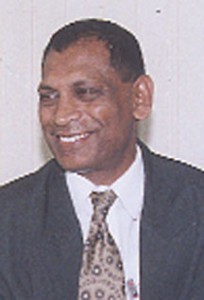Nine cases of dengue fever have been confirmed within the past week at Lethem as the outbreak in neighbouring Brazil persists but there is no need to issue a countrywide alert just yet, according to Minister of Health, Dr. Leslie Ramsammy.
The Ministry of Health has dispatched a team to Region Nine to monitor the situation while heavy surveillance remains at the border. Ramsammy told reporters yesterday that the dengue cases are of the DEN-2 type which is present here, adding that no form of haemorrhagic dengue is in the country.

A dengue advisory has been issued in Region Nine since the cases were confirmed but there are no immediate plans to issue a countrywide alert, Ramsammy stated.
He said this recent spike in Region Nine could mean one of many things, including that the vector has crossed borders.
Outside of Region Nine there has been an increase in the number of fever cases across the country resulting in the ministry issuing a call for all cases to be reported directly to them without delay.
“Nine cases are not alarming but they are enough to be concerned. We are now checking fevers, every fever and strengthening the surveillance systems that are in place to spot dengue fever among other infections,” Ramsammy stated.
But while public health officials are cooperating in full with the ministry and reporting all cases of fever Ramsammy noted that the same cannot be said for the private sector. The minister said he is not comfortable with the level of reporting coming out of a few hospitals, clinics and offices of private physicians.
He said the private offices are not exempt from reporting as is widely believed and noted that he is willing to use his power as minister to ensure that they comply with the call for immediate reports.
According to Ramsammy, the public health sector is now following up on dengue cases by going into homes and communities to see if other persons are infected.
“An investigation is carried out for every confirmed case where the focus is not on the affected person alone but their family and the community where they live among other things.”
Commenting on the rapid testing that is done to diagnose dengue locally, Ramsammy said the test has a 99 percent accuracy level but pointed out that there are times when it is not always accurate. He said public health officials no longer solely rely on the test to make a diagnosis but would also take into account the clinical evaluation of the patient.
Ramsammy added that the time-frame in which the testing is done could mean the difference between a right and wrong diagnosis. He noted that guidelines have been developed in this area for health officials to follow.
Reported dengue cases were at 103 earlier last month – some nine cases more than the corresponding period last year. Persons with the severe form of dengue will bleed with the classic symptoms being bleeding through the nose, in the gum, under the skin and vomiting in addition to the normal symptoms. The mild form of dengue results in fever, nausea, vomiting and aches in the joints.
Recently Ramsammy had underscored the need for a huge investment in vector control in the country to adequately address such viruses as dengue which he specifically mentioned as an emerging public health problem.
He also pointed to the importance of mosquito nets noting that the local bed net programme that was initiated in the hinterland will soon roll out into coastal areas.






